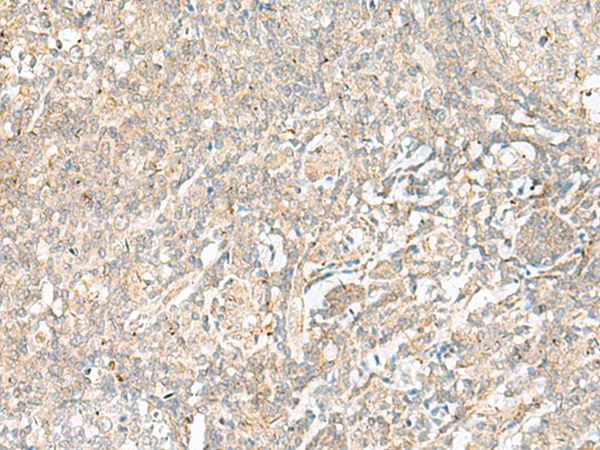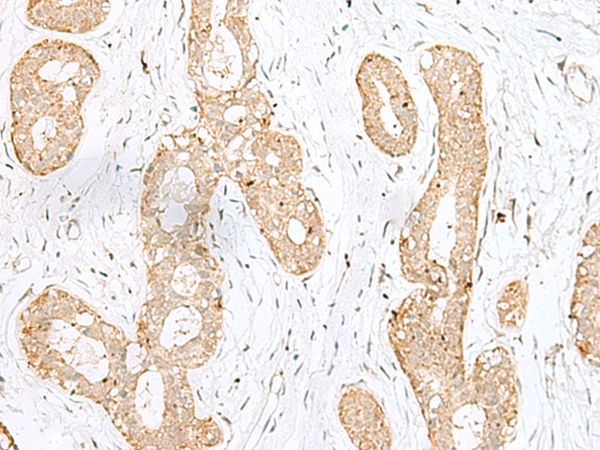

| WB | 咨询技术 | Human,Mouse,Rat |
| IF | 咨询技术 | Human,Mouse,Rat |
| IHC | 1/40-1/200 | Human,Mouse,Rat |
| ICC | 技术咨询 | Human,Mouse,Rat |
| FCM | 咨询技术 | Human,Mouse,Rat |
| Elisa | 1/5000-1/10000 | Human,Mouse,Rat |
| Aliases | BEX1; DJ79P11.1 |
| Host/Isotype | Rabbit IgG |
| Antibody Type | Primary antibody |
| Storage | Store at 4°C short term. Aliquot and store at -20°C long term. Avoid freeze/thaw cycles. |
| Species Reactivity | Human |
| Immunogen | Fusion protein of human BEX2 |
| Formulation | Purified antibody in PBS with 0.05% sodium azide and 50% glycerol. |
+ +
以下是关于BEX2抗体的3篇文献摘要,供参考:
---
1. **文献名称**: *BEX2 regulates mitochondrial apoptosis and G1 progression in neuroblastoma*
**作者**: Kim, J., et al. (2010)
**摘要**: 研究揭示了BEX2在神经母细胞瘤中的双重作用,通过调控线粒体凋亡通路(如BAX/BCL-2)抑制细胞死亡,同时通过下调Cyclin D1延缓细胞周期G1/S期转换。实验使用BEX2抗体验证了其在肿瘤组织中的表达模式。
---
2. **文献名称**: *Epigenetic silencing of BEX2 promotes breast cancer progression via suppression of TGF-β signaling*
**作者**: Lee, S., et al. (2015)
**摘要**: 本文发现乳腺癌中BEX2因启动子甲基化而表达降低,导致TGF-β信号通路失调。通过BEX2抗体染色证实其低表达与患者预后不良相关,恢复BEX2表达可抑制肿瘤细胞侵袭转移。
---
3. **文献名称**: *BEX2 is required for maintaining glioma stem cells and chemoresistance in glioblastoma*
**作者**: Wang, Y., et al. (2020)
**摘要**: 研究利用BEX2抗体及敲除模型,证明BEX2通过激活Wnt/β-catenin通路维持胶质母细胞瘤干细胞的自我更新能力,并介导替莫唑胺(TMZ)化疗抵抗,提示其作为潜在治疗靶点。
---
**备注**:若需获取具体文献,建议在PubMed或Google Scholar中按标题/作者检索。部分研究可能涉及BEX2的功能机制,而非直接针对抗体开发。
**Background of BEX2 Antibody**
BEX2 (Brain Expressed X-linked 2) is a member of the BEX/TAX1BP3 family, which comprises small, evolutionarily conserved proteins predominantly expressed in the nervous system. Initially identified for its role in neuronal development and differentiation, BEX2 has gained attention for its dual functions in both normal physiology and disease, particularly cancer. It interacts with key signaling pathways, including p53. NF-κB, and receptor tyrosine kinases, modulating processes like apoptosis, proliferation, and transcriptional regulation.
In cancer research, BEX2 exhibits context-dependent roles, acting as a tumor suppressor or oncogene. For instance, it is downregulated in glioblastoma, where its loss correlates with poor prognosis, while overexpression in breast or pancreatic cancers may drive tumor progression. This duality underscores its complex regulatory mechanisms and tissue-specific interactions.
BEX2 antibodies are essential tools for studying its expression, localization, and functional roles. They enable detection via techniques like Western blotting, immunohistochemistry, and immunofluorescence, aiding in the exploration of BEX2's involvement in diseases. Recent studies also highlight its potential as a therapeutic target or biomarker, particularly in cancers with dysregulated neurodevelopmental pathways. However, challenges remain in fully elucidating its molecular partners and signaling cross-talk, necessitating further research to harness its clinical relevance.
×